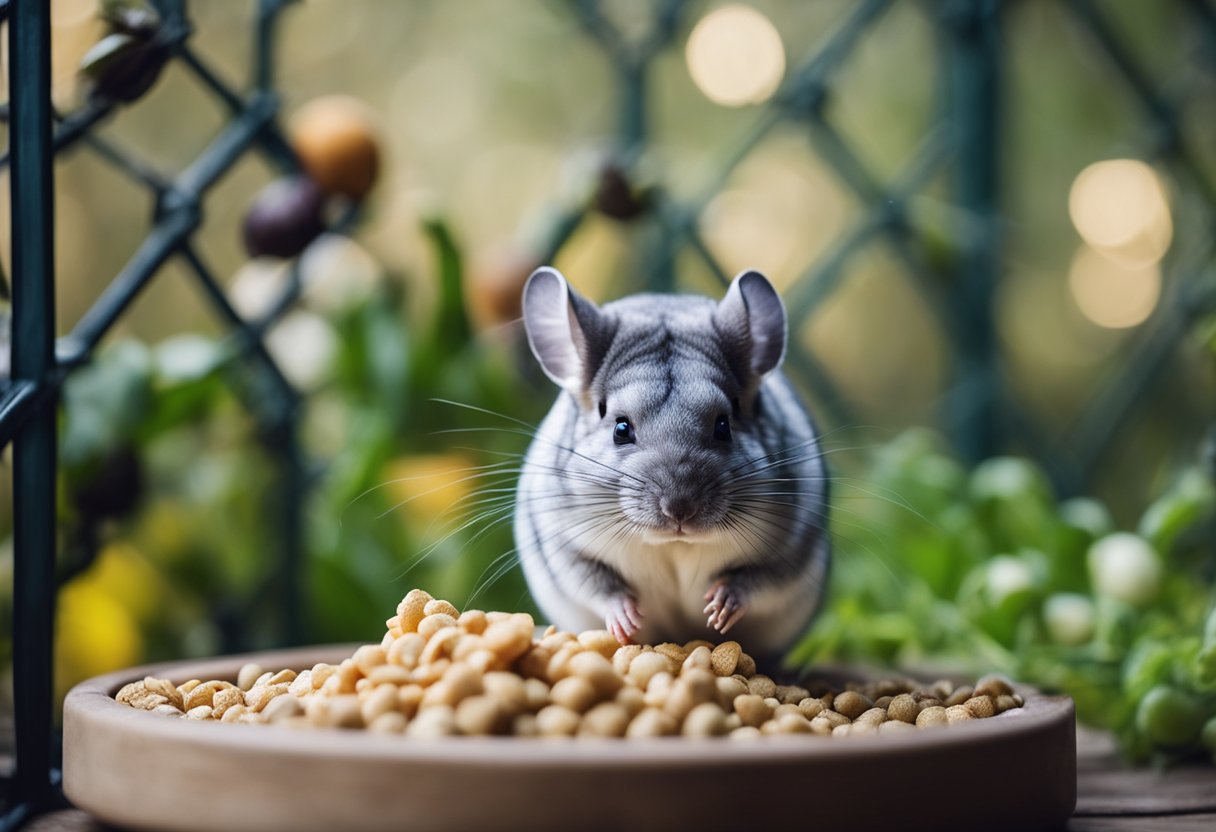Chinchillas are adorable pets that require a special diet to stay healthy. You might wonder if it’s okay for your chinchilla to eat hamster food. The simple answer is no; chinchillas should not regularly eat hamster food because their nutritional needs are quite different.

Feeding your chinchilla the right diet is crucial for its health and well-being. While both chinchillas and hamsters are rodents, their digestive systems and dietary requirements do not align. Understanding these differences can help you provide the best care for your furry friend.
Key Takeaways
- Chinchillas need a diet high in fiber and low in carbohydrates.
- Hamster food may contain harmful ingredients for chinchillas.
- Providing the correct diet is essential for maintaining your chinchilla’s health.
Understanding Chinchilla Dietary Needs

Chinchillas require specific dietary elements to maintain their health. It’s essential to provide a balanced diet that meets their unique nutritional needs and avoids dangerous foods. Understanding what chinchillas naturally eat can help you choose the right diet for your pet.
The Natural Diet of Chinchillas
In the wild, chinchillas primarily feed on grasses, seeds, and some fruits. They thrive on high-fiber foods that facilitate digestion and dental health. Their natural diet is low in fat and protein.
In captivity, you should focus on providing high-quality hay like timothy or orchard grass. This replicates their natural intake and promotes good digestion. Fresh hay should always be available. You can also offer small portions of specially formulated pellets designed for chinchillas.
Nutritional Requirements
A chinchilla’s diet must be high in fiber, with a recommended intake of 25-50% fiber daily. This fiber helps keep their digestive system functioning properly. Additionally, chinchillas need a small amount of protein, usually around 16-22%, which can be found in quality pellets.
Ensure your pet’s diet is low in fat and sugar to avoid health issues. Fresh water should always be available, and only occasional treats of approved fruits or vegetables are recommended. Monitoring your chinchilla’s weight and health regularly is crucial to adjust dietary needs as necessary.
Dangers of Inappropriate Foods
Feeding your chinchilla inappropriate foods can lead to severe health problems. For example, hamster food often contains seeds and nuts, which are high in fat and can cause obesity or liver issues. Foods that are too rich in sugars, like fruits, should be limited and only given as rare treats.
Watch out for harmful foods such as chocolate, dairy, or anything salty. Such items can be toxic to chinchillas. Always research new foods before introducing them to your pet’s diet to ensure safety and health.
Comparing Chinchilla Food to Hamster Food

Understanding the differences in dietary needs is essential when caring for chinchillas and hamsters. Their nutritional requirements vary significantly, and this can affect their health and well-being.
Ingredients and Nutritional Content
Chinchillas need a diet high in fiber and low in fat and carbohydrates. Their main diet consists of timothy hay, which provides the necessary fiber for healthy digestion. Chinchillas also require pellets made specifically for them, with ingredients like hay, grains, and occasional fruits or vegetables.
Hamster food, on the other hand, often includes seeds, nuts, and commercial pellets that are higher in carbohydrates. The ingredients can be more diverse, but they usually lack the high fiber content that chinchillas need. A typical hamster diet may not satisfy your chinchilla’s nutritional needs, leading to potential health issues.
Risks of Cross-Species Diets
Feeding hamster food to chinchillas can lead to serious health risks. Due to the higher carbohydrate content, chinchillas may experience obesity or diabetes, which can impact their lifespan.
Additionally, a diet lacking adequate fiber can lead to dental problems and digestive issues such as bloating or diarrhea. If you own both pets, it is crucial to ensure they each have a diet tailored to their specific needs to promote their health and avoid complications.
Resources

When considering your chinchilla’s diet, it is important to understand the differences between hamster food and chinchilla-specific nutrition.
Here are some useful resources you can explore:
- For a detailed look at why hamster food isn’t suitable for chinchillas, check out Can Chinchillas Eat Hamster Food? (Read Before You Feed!).
- Learn more about the nutritional needs of chinchillas in the article Can chinchillas eat hamster food? – Chef’s Resource.
- If you need quick answers regarding potential risks, visit Can Chinchillas Eat Hamster Food? Good or Toxic – can-eat.org.
- Understand the reactions your chinchilla may have if they consume hamster food by reading Can Chinchillas Eat Hamster Food? What You Need to Know!.
These resources provide helpful insights into proper chinchilla care and diet. Make sure to prioritize your pet’s health by using accurate, reliable information.
Frequently Asked Questions

Many pet owners have questions about how to properly care for their chinchillas. Understanding the right foods, potential dangers, and nutritional needs is important for keeping your chinchilla healthy.
What foods are safe for chinchillas to eat?
Chinchillas should primarily eat high-quality hay, such as timothy hay, which provides essential fiber. You can also offer small amounts of pellets specifically designed for chinchillas. Fresh vegetables, like leafy greens, can be given occasionally, but avoid fruits due to their high sugar content.
Are there any dangers in feeding chinchillas food meant for other rodents?
Yes, feeding chinchillas food meant for other rodents can be harmful. Hamster food, for instance, often has too much fat and sugar, which can lead to digestive issues and malnutrition. Always choose food specifically formulated for chinchillas to meet their unique dietary requirements.
What is the ideal diet for a chinchilla?
The ideal diet for a chinchilla consists mainly of unlimited hay and high-fiber pellets tailored for them. This helps with digestion and prevents obesity. You can occasionally offer treats like hay cubes or small amounts of safe fruits and vegetables, but moderation is key.
What common foods are toxic to chinchillas?
Certain foods are toxic to chinchillas and should be avoided. These include chocolate, caffeine, and any foods high in sugar or fat. Other toxic items are onions, garlic, and avocados, which can cause serious health issues if ingested.
How does chinchilla nutrition differ from that of other small pets?
Chinchillas require a higher fiber diet compared to other small pets like hamsters and guinea pigs. They also need significantly less fat and sugar. This difference is crucial for preventing health problems, especially digestive issues and obesity.
What should be avoided when feeding a chinchilla?
Avoid giving your chinchilla high-sugar treats, processed foods, and anything with artificial ingredients. Also, refrain from feeding them cereal, grains, or bread, as these do not meet their nutritional needs and can cause harm. Always prioritize their specific dietary needs to maintain their health.

